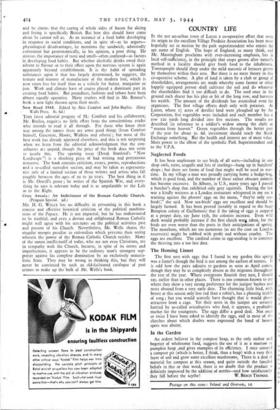COUNTRY LIFE IN the not tm-urban town of Luton a
co-operative effort that owes its origin to the excellent Village Produ'ce Association has been most hopefully set in motion by the park superintendent who enjoys the apt name of English. The hope of England, as many think, and Mr. Massingham proclaims with ever-increasing emphasis, lies in local self-sufficiency, in the principle that crops grown after nature's method in a locality should give fresh food to the inhabitants. Townspeople should sleep under the mild narcotic of lettuces grown by themselves within their area. But there is no mere theory in this co-operative scheme. A plot of land is taken by a club or group of shareholders, arrangements are made whereby some farmer or other happily equipped person shall cultivate the soil And do whatever the shareholders find it too difficult to do. The seed once in the ground each sharer has his plot or bit of the long row, and harvests his wealth. The amount of the dividends has astOniled even the organisers. The first village efforts dealt only with potatoes. At Luton, where if acres of derelict land were ploughed up by the Corporation, five vegetables were included and each member has a row 120 yards long divided into five sections. The results are described (in reference to a soldier's widow among the club) as "manna from heaven." Green vegetables through the better part of the year for about 3s. 6d. investment should teach the Stock Exchange something. But the health and interest are of most value. More power to the elbow of the symbolic Park Superintendent and to the V.PA.
Neglected Foods It has been unpleasant to see birds of all sorts—including in one shop owls, terns, seagulls and lots of starlings—hung up in butchers' shops ; but there are forms of food that might well be used in war- time. In my village a man was proudly carrying home a hedge-hog, I which is good food, and the number of these rather obscure animals has become excessive. In Albany, in U.S., many years ago I passed a butcher's shop that exhibited only grey squirrels. During the last war a kindly waitress at a London restaurant whispered in my ear a warning against the plovers' eggs on the menu "they're only sea- birds'," she said. Now sea-birds' eggs are excellent and should be largely farmed. It has been proved (notably in regard to the huge Bempton colony of Guillemots) that if the taking of eggs is stopped at a proper date, say June i5th, the colonies increase. Even wild duck would probably increase if the first clutch were taken, for the birds are even worse than the poets in their anticipations of spring. The moorhens, which are too numerous (as are the coot on Londe reservoirs) might be robbed with profit and without cruelty. The eggs are excellent. The cardinal crime in egg-stealing is to continue the thieving into a too late date.
The Homing Linnet The first nest with eggs that I found in my garden this spring was a linnet's though the bird is not among the earliest of nesters. It is odd how the pairs adjouin to gardens as soon as April comes, though they may be as completely absent as the migrants throughout the rest of the year. Where evergreens flourish they nest, I should say, earlier than in other places. There is one common known to me where they show a very strong preference for the juniper bushes and nests abound from a very early date. The charming little bird, with breast at this season only less red than a robin's, has a pleasing trickle of song ; but you would scarcely have thought that it would prove attractive from a cage. Yet their nests in the juniper are severely harried by so-called aviculturists who find, it appears, a profitable market for the youngsters, The eggs differ a good deal. Not once or twice I have been asked to identify the eggs, and in most of the clutches about which doubts were expressed the band of brown spots was absent.
In the Garden An ardent believer in the compost heap, as the only author and begetter of wholesome food, suggests the use of it as a marrow or pumpkin heap ,and gives examples of its efficiency. I once covered a compost pit (which is better, I think, than a heap) with a very thin layer of soil and grew some excellent mushrooms, There is a deal of material for compost at this season, and quite outside the fanciful beliefs in this or that weed, there is no doubt that the product is definitely improved by the addition of nettles—and how satisfactorily
Postage on this issue: Inland and Overseas, id.






















 Previous page
Previous page